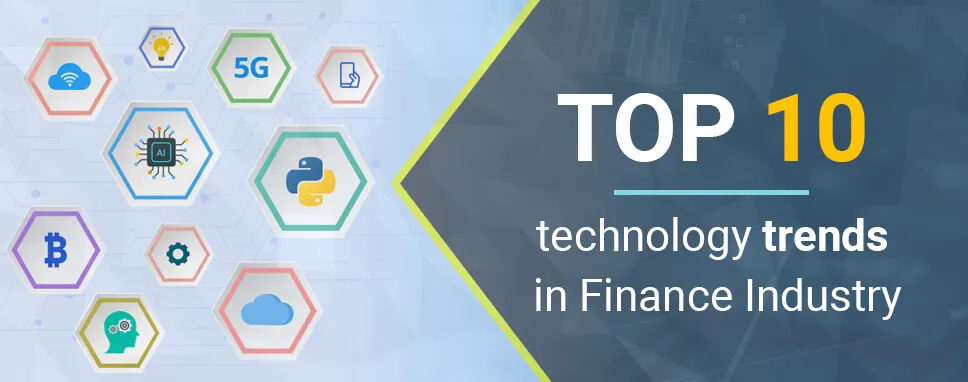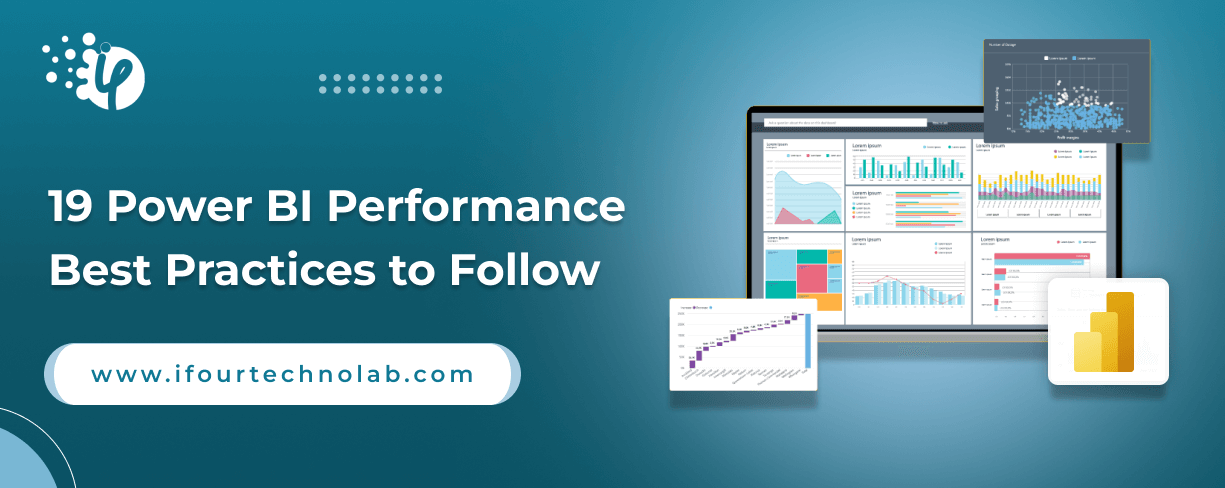Power BI Report Server: Key Features and Elements
Every CTO knows the struggle of managing complex reports. The inefficiency of scattered data, the constant juggling between reporting tools, the challenge of ensuring accurate KPIs...
Kapil Panchal - October 02, 2020
Listening is fun too.
Straighten your back and cherish with coffee - PLAY !

The financial services industry has been repeatedly upgraded by technology. Gone are the days in which clients had to navigate to their local banks to make transactions or automatically balance their check books.
The trends involve the ongoing digital transformation, the origination of FinTech companies, the expanding role of Artificial Intelligence (AI) and robotics, and re-thinking the conviction of money. But new apps aren't the only technology that's reshaping financial services. Banks and other corporates are using new tech in many ways to boost the customer experience, rationalize their own processes and increase services.
Here is list of top 10 tech trends to watch for Finance Industry in 2020.
“Artificial intelligence is going to change the way that advisors serve and interact with their clients. Not only does it offer the ability to process large amounts of data extremely quickly, AI will eliminate tasks for advisors and their teams. This time-savings will allow for deeper and more meaningful relationships with clients. Also, because of the ability of AI to predict customer actions, advisors will become extremely more proactive and personal with their clients. The insight will be timelier and more relatable for the specific information dealing with a client's financial plan.”
- Matt Reiner, Founder at Benjamin
“Automation is huge in finance. The technology in the finance field has gone far beyond having a system crunch numbers for you, it can turn data into insights that can help your business grow or enable individuals to better budget their accounts. Tech can also prevent costly errors. It really is game changing and can even be done via your mobile phone.”
- Kimberly Porter, CEO at Microcredit Summit
“One of the perfect strategies to regulate a technology’s impact on an industry is to glance at how an industry is expending in it. The banking sector is recently one of the top investors by industry in big data and business analytics solutions as per to the IDC Semi-annual Big Data.
Financial institutions can use big data to know more about consumers and be capable to originate business decisions in real-time involving learning about a customer's spending habits, sales management such as segregating customers to enhance marketing as well as product cross-selling, fraud management, risk assessment, and reporting, and customer feedback analysis.”
“Digital payments have become more important than ever, especially as we head into the new normal in this pandemic season. COVID-19 has influenced consumers to consider P2P transfer, contactless payments, and global payments since they are encouraged to stay in their homes and limit physical contact. More and more enterprises are also following the lead and offering interesting online services by partnering with fintech companies. Going paperless and fully digital also allows banks to save a lot of money in terms of their operational costs.
Funding has been affected but as the need for cashless payment platforms become more prominent, we're seeing a rebound in investments in this area.”
- Michael Hammelburger, CEO at Expense Reduction Group
“Blockchain and cryptocurrency have changed and continues to change how the finance industry works. They enable peer to peer transactions without the need for expensive infrastructure or timely and costly intermediaries. Trust is usually the domain of governments and banks; the tech now allows the following via an app or web page:
Via smart contracts assets can be tracked and protected. Identities and credentials can be issued and due to the underlying ledger, their validity can be trusted. All transactions have increased traceability and enhanced security. Blockchain and crypto transactions occur in real-time or near real-time. This means faster transaction times and speeds for customers. A wire transfer that would take 1-3 business days can now be cleared within a few minutes to 2 hours. The ICO boom changed venture capital and how funding is allocated. Restrictions in geography, financial savviness, and funding currency have been erased.”
- Austin Tuwiner, Owner at BitPremier Media LLC
“Blockchain can easily compress the notoriously lengthy processes of sending money abroad, which is a superior competitive advantage for money transfer service providers. However, while the technology is there and its advantages are definite, organizations are still very reluctant to adopt it. Still, I think blockchain’s time to make the financial industry faster and more transparent has finally come, and we’ll be seeing more success stories soon.”
- Ivan Kot, Senior Manager at Itransition
“The finance industry is changing and it is due to some of the new trends such as AI, automation, and blockchain. Blockchain works in two ways: firstly, it's a great security solution because it has multiple points of verification built into each transaction, and secondly, with its person to person transfer technology, there are fewer financial costs to customers because there is no intermediary fee charge connected to the transfer. With all these technology trends, banks are now able to concentrate on higher priority concerns rather than the smaller issues of bank balances and other low priority enquiries.”
- Andrew Roderick, CEO at Credit Repair Companies
“One of the recent trends is the tokenization of financial instruments. It allows unlocking closed private placements (such as venture funds, industrial plants) to a wide public, making legal rules hard-coded into the technology, makes trading of private stock easier. The potential market for tokenization is estimated in trillions of dollars.”
- Borys Pikalov, Co-Founder & Head of Business Analytics at Stobox.io
“Earned wage access is a rapidly growing trend in the fintech sector. It has become even more relevant during the throws of the coronavirus pandemic and mounting economic uncertainty. With close to 80 percent of the US population living pay check to pay check, the ability of fintech providers to provide fast, efficient access to earned income is going to change how people live, work and save.
Recent studies reinforce the benefits of earned wage access solutions to employee financial wellness while simultaneously meeting the business objectives of employers.”
- Shannon Furey, Public Relations Director at M studio LLC
“Mobile banking and improved digital experiences assist advanced tech to boost automation and predictive analytics so that financial institutions can increase profitably, improve ROI and significantly enhance the overall user experience.
Adopting and executing a digital-first mindset - Integration and cloud migration for financial institutions to better position themselves for the future.”
- Sivan Ron, Account Executive at LoBello Communications, LLC
“Mobile and digital wallets are on the rise in United States because of their ease of access and increased security measures. Digital wallets allow you to manage your credit card information and make purchases digitally, or in person via contactless technology. When you conduct a transaction, a digital wallet creates a token that’s used in place of your actual credit card details, making it easier to protect sensitive payment information. Your information could theoretically still be stolen, but it’d most likely happen through stolen login information or a lost device that’s discovered by scammers, rather than through the transaction itself. Careful password management and strict device security measures are essential.
Digital wallets are especially useful for shopping and transferring money online, where fraud is rampant, or when paying with your phone at the gas station, where credit card skimmers are all too common.
A mobile wallet is a type of digital wallet that’s accessible through an app on a mobile device, like your phone or a wearable. Using a mobile wallet allows you to go contactless, or much more contactless than swiping your credit card in the card reader. Especially during the pandemic, this form of payment has increased in popularity, because, to many, it simply feels safer.”
- Mason Miranda, Credit Industry Specialist at Credit Card Insider
“From our industry perspective, on-demand accounting services platforms will continue disrupting the professional services industry while helping to define the future of work. There is a ground-breaking, retooling process taking place around the multibillion-dollar professional services industry around the world, changing how services are delivered and who they are performed by.
Today, companies need to leverage not only their industry expertise but also be fully on top of technological advancements that will allow them to offer tailor-made solutions for consumers that directly alleviate issues that have dragged on for decades – whether product-wise or in the professional services realm. Fintech solutions are playing a fundamental role in this sweeping transformation.”
- Nicolas Villar from The Tag Experience
The transpiring technologies in the financial services industry have influenced almost all the business particulars in the years after 2010. Arduous practices are gone, methods have become more transparent, transactions are laminated with security and accuracy, and clients are provided a great deal of personalization across products and services. With the above-depicted financial services technology trends at the core of systems, industries should well be able to boost their consumer intelligence capability, which can be further used to develop audience-centric growth.

Every CTO knows the struggle of managing complex reports. The inefficiency of scattered data, the constant juggling between reporting tools, the challenge of ensuring accurate KPIs...

The very first reason why you should implement Row Level Security is to foster trust, a crucial element for any business's success. Next, it reduces data clutter and helps you load...

The performance of Power BI is significantly influenced by two essential factors: design consistency and the rapid loading of BI elements. This holds true whether you choose Tableau...